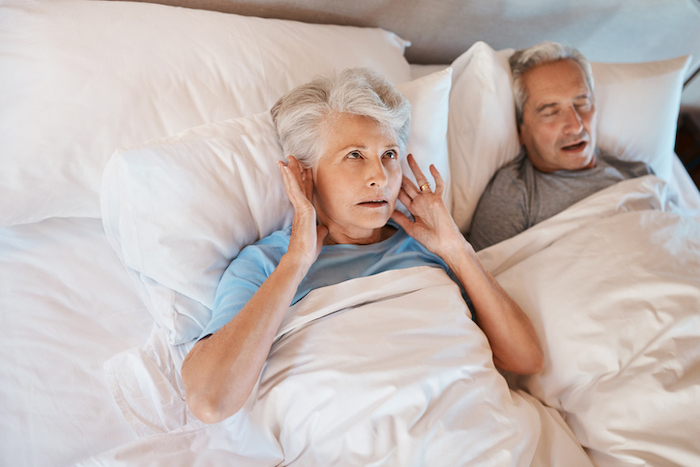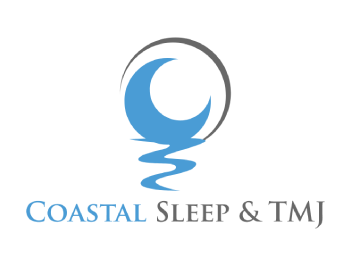Do you snore at night? Does it prevent you from getting a good night’s sleep?
Snoring can still be very disruptive even if not related to sleep apnea. It can interfere with the necessary restorative sleep for the person snoring and their bed partner.
So disruptive studies have shown similar symptoms as those found in a person with Obstructive Sleep Apnea (OSA). The only way to know if a person’s snoring is or is not related to OSA is wi th a proper, simple medical evaluation.
th a proper, simple medical evaluation.
Oral Appliance Therapy is indicated and works very well for patients with primary snoring without OSA.
What is Snoring?
Snoring is a disruptive event occurring while you’re sleeping. The signature snoring noise is caused by vibrations in your airway passages. It’s harsh and rhythmic, caused by the soft tissues in the back of your throat vibrating as air passes through restricted airways.
If you snore only occasionally, it’s more likely that other factors are coming into play. If you have sinus issues or nasal congestion, you’re going to breathe through your mouth more when you’re sleeping. That can lead to snoring, as your body attempts to get enough air into your lungs. It may go away when your congestion clears up.
When you snore, it can be easy to brush it off. Many people want to hide it because they think it’s embarrassing that they snore. But this isn’t something to laugh at. If you’re snoring regularly, and you or another member of your family is noticing it, it’s important to seek out treatment. Untreated sleep conditions impact your quality of life if you continue to just act like you’re living as normal.
What Causes Snoring?
There may be a fine line between “Do I only Snore” and “Sleep Apnea.” It is important to know what side of the line you are on. At Coastal Virginia Sleep Solutions, we work with physicians to help you figure that out.
An obstruction to the free flow of air through the passages at the back of the mouth and nose causes snoring and sleep apnea. This obstruction causes turbulent airflow, which produces vibrations in the soft tissue. The sound generated from these vibrations is called snoring.
Historically snoring has been a social problem, with the bed partner being the victim and the snorer the object of many jokes. It was often thought to be a normal part of aging … “doesn’t everyone snore when they get older?”
Today, snoring is a possible sign of a serious medical problem, Obstructive Sleep Apnea (OSA). These two terms describe parts of the continuum of sleep-disordered breathing. This spectrum ranges from the slight vibration of the oral tissues at its mildest to death from asphyxiation at its most extreme. Between lies snoring and periods of complete airway closure called “apnea.”
The Dangers of Snoring
When you fall asleep, the muscles and tissues of the airway relax, and the airway becomes smaller. The airflow causes the relaxed tissues of the mouth and throat to vibrate, producing a “snoring” sound. The more the tissues relax, the narrower the airway becomes, which speeds up the airflow. This makes the relaxed tissues vibrate at various pitches.
When relaxed enough, these same tissues can close the airway (OSA) and cause periods of silence. The relaxation of the tongue can cause it to fall back and touch the back of the throat. Eventually, the body realizes it is suffocating due to this airway closure. It arouses the sleeper (does not awaken) to a “less-deep level of sleep,” thus causing the body to move to restart or improve breathing.
In the sleep apnea patient, this process typically repeats 40 to 60 times per hour! Thus resulting in severe disruptions to normal sleep. This leads to an increased risk of significant health problems and can even be the cause of sudden death from a stroke or heart attack. Seeking a proper diagnosis and treatment will reduce or eliminate your elevated risk for these concerns and improve your overall quality of life.
Oral Appliances for Snoring
Snoring can be effectively treated with the use of an oral appliance. When you sleep, an oral appliance is worn over your teeth like an orthodontic retainer to keep your airway open and prevent snoring. A custom-made oral appliance can help you sleep better, wake up feeling more rested, and improve your overall health.
Oral appliances work by readjusting the structures of your mouth to keep the airways open while you’re sleeping. They reposition the jaw and tongue, so that the jaw is a bit forward. This small, simple movement can make all of the difference when it comes to your breathing. It promotes regular breathing and helps you to stop or reduce your snoring.
Each oral appliance is customized for your smile. Everyone is different. The snoring you experience and the positioning of your tissues may be different than someone else. When we fit you for an oral device, we ensure that it’s the perfect position for your specific needs. Without customization, oral appliances are a gamble. You don’t know if they’ll be successful until after you’ve already bought it and brought it home. You can have confidence in a custom appliance.
Oral Devices From Professionals
You should only get an oral appliance that’s prescribed by a dental professional. We want to provide an accurate diagnosis and ensure that this is the right path for you. When we customize a device, we do a thorough evaluation of your mouth. Knowing your current state of oral health and your exact anatomical features allows us to provide you with an appliance that’s going to fit you perfectly.
We offer follow up visits to monitor the wear and tear on your appliance and the state of your oral health. It’s important to know your progress and ensure that it’s going to be a long-term solution for you. The appliance should be something that’s comfortable for you to wear. The appliance should still be effective, even if some things we need to tweak. We’ll modify the device so that it continues to work well for your needs.
While oral appliance therapy works well for many patients, it may not be the correct solution for you. Or, you may need modifications done to your device. Keep track on if you wake up from snoring, others in the household notice the snoring, or how you feel upon waking up. We take into consideration your other health conditions and medications so that we can produce the best result for you.
Frequently Asked Questions
Do you have sleep apnea, or just occasional snoring? Learn more about snoring by reading the answers to these commonly asked questions.
Can sleep apnea snoring be cured?
Yes, we can cure sleep apnea snoring. The most effective way to cure this is CPAP therapy. A CPAP machine gives continuous airflow pressure to help patients breathe throughout the night without snoring.
How do I stop snoring from sleep apnea?
The best way to stop sleep apnea symptoms, including snoring, is to treat your sleep apnea. If you are overweight, we recommend you take steps to lose weight and get into shape. Patients should also limit their alcohol exposure, quit smoking, and follow a routine sleep schedule.
How do I know if I have sleep apnea snoring?
If you wake up often at night to catch a breath or gasp for air, you have sleep apnea snoring. If you do not and rarely wake up at night for no reason, you have regular snoring. The difference between regular and sleep apnea snoring is that you will stop breathing at certain points during the night because of a blockage in your airway. We do not associate regular snoring with lapses in breathing.
Does everyone with sleep apnea snore?
Most patients with sleep apnea snore, but not all do. Every patient with sleep apnea varies in their symptoms. Some patients may snore lightly, not know they snore, or not at all.
What is the best sleep position for sleep apnea?
The best position for a patient with sleep apnea is sleeping on your side, preferably on the right side. This reduces snoring and encourages blood and airflow.
Does sleep apnea happen every night?
Patients with sleep apnea can experience apneas multiple times a night, each one lasting 10-30 seconds. In patients with severe sleep apnea, this can happen up to 400 times per night.
